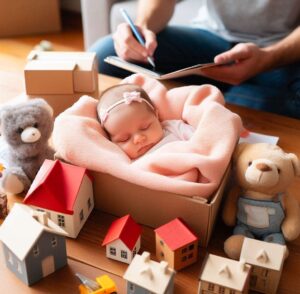Tips and Tricks for New Parents for Moving House with a New-born
Moving house can be both exciting and stressful, but relocating with a newborn baby adds a whole new dimension of careful planning and organization. The key to facilitating a smooth transition for both you and your baby lies primarily in meticulous preparation, mindful packing, and careful adjustment in the new environment.

The Pre-move Stage
A great move begins with a well-structured pre-move stage. To ensure a seamless transition to your new home, it’s essential to start preparations early and methodically. The first step is to declutter your current home. This means going through each room and separating items you need to keep, discard, donate, or sell. By trimming down on unnecessary items, you make packing more manageable and less time-consuming. This step also has added benefits for the new home, where it can prevent overcrowding and chaos, helping create a safer environment for your newborn.
When it’s time to pack, take a systematic approach to prevent any mix-up of items and to ensure that all necessary baby items are easily accessible. This is important for items your baby uses daily like clothes, feeding supplies, and toys. Label each box accordingly, preferably with both the content and the room it belongs to, which in turn would make the unpacking process swift and organized in your new home.
Many people tend to neglect the process of a move by maintaining a routine. For a newborn, routines are important. They provide a sense of safety and help them understand what’s expected at different times of the day, thus instilling a sense of security and regularity. Amid the overwhelming task of moving, strive to keep your baby’s eating and sleeping schedule consistent. This can reduce stress and confusion for your newborn.
Your pre-move preparation should include a baby moving kit. This bespoke kit should contain all the essential items your baby will require in the first couple of days after the move, before you’ve had a chance to unpack everything. Quick access to these essentials will save you time and alleviate stress. The kit should include items like diapers, wipes, a change of clothes, bottles, formula or breast milk, comfort toys, and other essentials your baby can’t do without even for a day. This significant step ensures that the needs of your baby are prioritized, providing comfort and peace of mind during a period that can be both exciting and stressful.
Hiring a Reliable and Safe Moving Company
Selecting the right moving company makes a huge difference when it comes to peace of mind. The company should not only be reliable but also empathetic to your special situation of moving with a newborn. To ascertain their reliability, you can start by seeking referrals from friends and family or exploring online reviews. Prioritize companies that receive positive feedback for their professionalism, punctuality, and especially for handling items with care. Indeed, a company that regularly receives positive reviews from families is likely experienced in managing the nuances of moving with children, making them an optimal option.
Hiring a moving company that offers professional packing services can significantly lighten your load. This aspect is particularly beneficial if you are moving with a newborn, as it often frees you up to concentrate more on your baby’s needs. Professional movers have the experience and tools to pack items efficiently, swiftly, and safely, taking a considerable amount of stress off your shoulders.
The concept of ‘safety first’ should not be confined to how your items are physically handled. An essential aspect of choosing a moving company lies in ensuring that they have comprehensive insurance coverage. This serves as an added protection for your belongings. In case of any eventuality, like accidents or damage during transit, your possessions are covered. Always verify the mover’s insurance policy details. Confirm that they are fully insured and understand the terms of their coverage before making a decision.
Moving Day
The actual day of relocation can be the most stressful part of the moving process, especially for families with newborns. To alleviate this stress, consider having a devoted caregiver for your child on moving day. This could be a trusted family member, a close friend, or even a professional nanny. Having someone solely focused on your baby’s needs allows you to concentrate on the move’s logistics. Not only will this help the move go more smoothly, but it also ensures that your baby continues to receive the attention and care they need amidst the chaotic day.
It’s vital to maintain your baby’s routine as much as possible on the day of the move. Despite the day’s unusual activity, attempt to keep mealtimes, nap times, and playtimes consistent. A sense of routine can provide a sense of normalcy and security for your baby amidst the unfamiliar disruption.
A golden rule for moving day is to keep all your baby essentials within easy reach. This includes items like your baby’s food, diapers, favorite toys, or comfort blanket. This will make sure that your baby’s needs are catered to promptly and conveniently, irrespective of the moving activities taking place.
Moving day can also be stressful for a newborn due to the change in environment and climate. Be conscious of the weather conditions on the day of the move. If it’s a hot day, make sure your baby is dressed lightly and has ample water if bottle-fed, or ensure the breastfeeding mother stays hydrated. On colder days, make sure the baby is dressed warmly and the new home is preheated before their arrival. This awareness of the baby’s comfort during climatic changes contributes significantly to making your relocation experience as smooth as possible.
Moving day with a newborn requires special attention. By securing a caregiver for the baby, adhering to your baby’s routine, keeping essentials at arm’s length, and considering the climate, you can ensure your baby’s happiness and comfort, making the moving experience less stressful for both you and your child.
Creating a Safe and Comfortable Environment
As you begin to settle into your new home, putting your newborn’s safety and comfort first is imperative. Once you’ve arrived, your primary focus should be on setting up your baby’s nursery. During the unpacking process, some areas are typically in turmoil. Having a fully arranged, clean, and calming nursery can act as a safe haven amidst all the chaos – a place where your baby can rest and play undisturbed. This zone sets the foundation for your baby’s new routine.
Unpacking and organizing your baby’s belongings should be done systematically to promote a sense of order and familiarity. Aim to place items in similar spots as they were in your old home. For example, if the changing table was to the right of the crib in your previous home, try to mimic that setup in your new space. This consistency can help your baby adjust and maintain a sense of security.
Re-establishing routines as swiftly as possible is another important aspect of creating a comfortable environment. Despite the change in space, your baby’s sleeping, feeding, and playtimes should resume their usual pattern. This continuity can tremendously support your baby in adapting to their unfamiliar environment and ensure they feel safe and secure.
It’s crucial to facilitate familiarization with the new surroundings immediately upon arrival. You can achieve this by having your baby explore the new spaces (with your supervision), such as the living room, kitchen, or garden. Gradual exposure to the different sounds, sights, and smells of this new setting can aid in your baby’s acclimatization to the home.
Creating a safe and comfortable environment for your newborn in a new home revolves around planning spaces to preserve old routines, fostering consistency, and encouraging gradual familiarity with the new surroundings. All of these will contribute to a seamless transition for your baby and help them nurture a sense of security and comfort in their new home.
Keeping Your Baby’s Health in Check
With so many changes and distractions associated with a move, it is essential to continue prioritizing your baby’s health. Pay attention to subtle signs of stress or discomfort in your baby as a disruption of their routine can affect their well-being. Keep a lookout for changes in their sleeping or eating habits, increased fussiness, or altered bowel movements. All of these can indicate that the baby is experiencing stress due to the move.
Maintaining a routine baby check-up schedule with your pediatrician is also essential during this time. Such visits help ensure that your baby’s growth and development are on the right track and that any possible health issues are tackled promptly. Ensure your baby’s vaccinations are up-to-date. Vaccinations protect your baby from various diseases, which is all the more crucial when moving to a new location that could expose your baby to different environmental factors and germs.
If your move entails shifting to a new city or state, finding a new healthcare provider for your baby should be among your top priorities. Take time to research and find a reputable pediatrician in your new area. References from your current pediatrician, recommendations from new neighbors or local family groups, and online reviews are all good places to start. Once you have settled on a new healthcare provider, arrange a ‘getting to know you’ visit to acquaint your baby with the doctor and prevent future anxiety.
It’s important to update your insurance details promptly after the move. Your healthcare insurance needs to reflect your new address and should cover your new healthcare provider to avoid any coverage issues during medical emergencies or routine check-ups.
While managing the logistics of your move is essential, remembering to prioritize your baby’s health is even more crucial. Constant vigilance for signs of stress, keeping up with check-ups and vaccinations, finding a reputable pediatrician, and updating insurance details are key steps to ensuring that your baby remains healthy and happy during this transition period.
Other posts
© 2025 Local Movers. All rights reserved.
